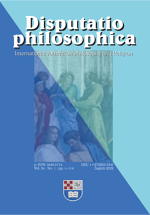How Science Transformed Descartes' Philosophical Discourse: The Curious Case of Animal Spirits
How Science Transformed Descartes' Philosophical Discourse: The Curious Case of Animal Spirits
Author(s): Pavle MijovićSubject(s): Epistemology, Early Modern Philosophy, Contemporary Philosophy, Philosophy of Science
Published by: Fakultet filozofije i religijskih znanosti, Sveučilište u Zagrebu
Keywords: Quine; epistemology; cosmic exile; Descartes; animal spirits;
Summary/Abstract: This paper is about the relationship between science and philosophy, or about the naturalization of philosophy. In the first part of the paper, we aim to present Quine’s theoretical framework related to the scientific impact on philosophical discourse and inquiry. In his philosophical writings, Quine emphasized the importance of science, in naturalized or normative epistemology forms. The idea of a more tenable, science–dependent knowledge position, is often seen as central to Quine’s epistemology. Far from any form of cosmic exile, philosophers, according to Quine, adopt the best knowledge available to them at a given time. Something very similar occurs in Descartes’ concept of animal spirits, showing that the use of the best available scientific knowledge at a given moment can easily be found in the French philosopher’s work. Quine’s conception, developed in the field of analytic philosophy, is found in Descartes’ notion of animal spirits, demonstrating the influence of the dominant scientific paradigm on philosophical discourse. Since we consider the Quinean framework very relevant, we have adopted his view as a sort of interpretative paradigm that helps us to better understand a particular problem from the domain of history of philosophy. The second part of the paper presents the notion of animal spirits seen in Descartes’ philosophy as intermediary entities linking mind and body. Once a powerful scientific notion, animal spirits withered away with the advancement of science and were substituted with other scientific paradigms. The notion of animal spirits was seen as Descartes’ critical point and was often neglected in philosophical analysis. In this paper, we advance a hypothesis on how science transformed Descartes’ philosophical discourse by analyzing the curious case of animal spirits, showing at the same time the limitations and shortcomings of this new modus philosophandi.
Journal: Disputatio philosophica: International Journal on Philosophy and Religion
- Issue Year: 24/2022
- Issue No: 1
- Page Range: 3-16
- Page Count: 14
- Language: English

